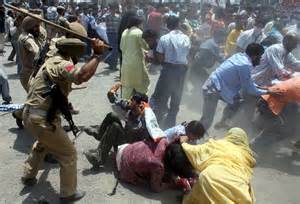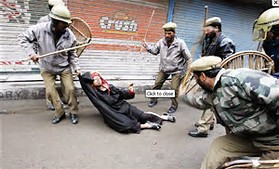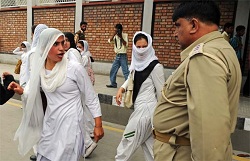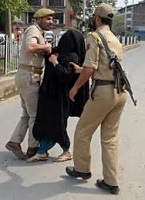Report of Seminar on International Women's Day & Women in Kashmir
|
In connection with International Women’s Day, MUSLIM Institute organized a seminar “International Women’s Day and Women in Kashmir” on Saturday, 7th March 2015 at National Library of Pakistan, Islamabad. The purpose of seminar was to highlight the women rights situation in Kashmir and draw attention of international community towards the same. It also aimed to highlight the role that Kashmiri women are playing and can play further for achieving their rights, for resolution of Kashmir issue and hence achieving the sustainable peace in the region.
|
|
|
|
Former Federal Minister Dr. Attia Anayatullah presided over the seminar whereas Director General, Institute of Strategic Studies Islamabad & Former Permanent Representative of Pakistan in United Nations Ambassador (R) Masood Khan was guest of honor on the occasion. Senior Member of Advisory Board, MUSLIM Institute & Former Secretary General for Foreign Affairs Mr. Akram Zaki, Minister for Social Welfare Azad Jammu & Kashmir Ms. Farzana Yaqoob, Women Rights Activist Ms. Shameem Shaal and Research Associate of MUSLIM Institute Mr. Usman Hasan spoke on the occasion. Chairperson Dukhtran e Millat (Daughters of the Nation), Jammu & Kashmir Syeda Asiya Andrabi and Co-Director International Action Center USA, Ms. Sara Flounders shared their views through video link address. Public Relations Coordinator of MUSLIM Institute Mr. Tahir Mehmood moderated the proceedings of the seminar. Foreign delegates, intellectuals, researchers, politicians, parliamentarians, academicians, students and journalists also participated in the seminar.
|
|
|
|
Salient points of the addresses of speakers are as under:-
Women in conflicts zones carry the heaviest burdens and bear the greatest weight of occupation and same is the case with Kashmiri women. Kashmir represents the worst case of human barbarity and particularly the condition of women in Indian Occupied Kashmir is vulnerable. Women in Kashmir don’t enjoy the basic rights which are given under the Universal Declaration of Human Rights (UDHR) and even promised under CEDAW (The Convention on the Elimination of All Forms of Discrimination Against Women) adopted in 1979 by the United Nations General Assembly described as an international bill of rights for women. This defines women rights and their fundamental freedom in the political, economic, social, cultural, and civil or any other sphere of life. Unfortunately, the international instruments have no impact on the situation of human rights in Kashmir and Indian government is not providing the basic rights to the Kashmiri people especially to women. That’s why Indian government doesn’t allow international representatives and foreign media to enter in Jammu & Kashmir.
 |
Root cause of women rights violation in Kashmir is Indian illegal occupation. This occupation is multidimensional i.e. military, political, cultural aggression and no access to human rights. During the separation of sub-Continent, unlike other areas, Kashmiris were not given freedom of choice to join either Pakistan or India and it hasn’t happened until now. Since 1947 there is huge burden of brutality on people asking for their rights. In the end of 1980s, a new black chapter of severe violation of human rights started which continues till now and women are worst affected in this regard also. Since 1989, more than ten thousand Kashmiri women have been gang raped by Indian forces and more than twenty two thousand have been widowed and thousands are living the lives of half widows whose husbands have disappeared and their fate remains unknown.
In Kashmir, women are being raped with impunity and most of them go unreported given the social stigma and fear of retribution by the Indian Government. Further the black laws implemented by Indian government in Kashmir give impunity to Indian forces and protect their atrocities and this has added to the miseries of Kashmiris.
|
|
|
|
 |
In Kashmir, women haven’t freedom and protection in society due to state terrorism by Indian occupied troops. Their husbands, brothers and sons are brutally murdered in front of their eyes. Similarly males of the family are forced to stand while their women are being raped. It is psychological trauma and to be a woman has become a crime in Kashmir. Kashmiri women are victim of Indian war crimes. Ratio of stress related diseases has increased from 10 percent to 60-70 percent from 1990 till date making 70 out of 100 women a psychological patient. Women carry burden of murdered men as they are unable to earn livelihood for themselves and for their children in presence of about 800 thousand troops. Orphans have no access to good education and health facilities. These sufferings are not accidental but are being used as a tool to achieve military objectives such as spreading political terror, suppressing the voice of freedom, breaking the resistance against status quo etc. Kashmiri women since last seven decades are fighting for just cause and have given all these sacrifices for getting their basic rights and peace in their homeland.
Kashmiri women stand resilient today in their victimhood. Tribute to women who are facing violence, crackdown, fake encounters, disappearances, brutal torture and shoot to kill incidents but still struggling to have their rights. Women are principal stakeholders in Kashmir issue and it is time that everyone has to recognize that. This is time when women around the world are putting their demands for full education, health care, security etc. Theme of international women day is ‘make it happen’ and indeed the brave women of Kashmir will not be intimidated by occupied troops.
 |
For international community, the Kashmiri women are a forgotten chapter. If sexual assault against women is committed in other countries, the conscience of international community is jolted and it responds but when Kashmiri women are victimized, conscience of world is silent because it is driven by realpolitik. Bigger the country, more influential it is, more impunity it will have. Justice should not be selective and this message should go from the civil society to important capitals which influence the decisions across the globe. Violence against women is a crime against humanity and therefore all lawyers of human rights have to step up and see where Indian atrocities cross the lines. Kashmir issue should be resolved peacefully, legally and logically.
One big problem is access to information from the ground as Indian government doesn’t give access to free media for coverage of ground realities. Due to Indian hegemony, suffering women and children are missing from media. Lack of access of international institutions makes women soft target for sexual and physical abuse. Victims are living in constant fear and culprits are seldom brought to law. Highlight of My Lai massacre changed history of Vietnam and its credit goes to media. Story of tragedy of Bosnian women and their hanging bodies became milestone. Ruthless killings of a Palestinian boy hit the headlines of the world and created a popular support for the Palestinian people. Kashmiri stories need to find place in media which will create awareness in different parts of world. Media should give voice to voiceless and highlight women’s condition and their role in Kashmir struggle by publishing the stories of women. Social media should be used to create awareness regarding Kashmir issue by publishing stories of victimized women.
|
|
|
The Kashmir issue has been forgotten over the globe and it needs to be raised once again with reference of International Day of Women. People of Kashmir are not letting go down their struggle, so we should stand with them and talk for them. Pakistan has always made efforts to highlight Kashmir cause and has not turned back on its principled stand based on UN resolutions. It is ready to make every effort to resolve the issue. People of Pakistan have always stood along with Kashmiris and have been raising voice for them. Complexities of international politics are hurdle in achieving these goals. Education, economy, technology and wisdom are needed to resolve such issues and to secure rights of Kashmiri women.
 |
This painful story needs to come to an end. There has to be sustainable peace in Kashmir which cannot be imposed by military means. A small army can defeat a big army but even a biggest army cannot defeat a nation. Indian forces will not be able to impose their will on the people of Kashmir. Exit of Indian forces from Kashmir is verdict of history and it will happen if the people continue their struggle as they are doing. In a small valley, presence of eight hundred thousand military and paramilitary troops with the black laws giving ‘license to kill’, has no justification. There is distinction between freedom fighters and terrorists and this distinction should be kept in mind while discussing about Kashmiris’ freedom struggle. An important ingredient in seeking sustainable peace is that the very people, who are affected, must be a part of the solution. In Kashmir, we don’t see women in conflict resolution and peace building process. Women as survivors, protectors, freedom fighters and peace builders, all should be documented in stakeholder analysis. There is need of inclusive security to bring women to peace talks, table, CBMs, negotiations. Women are able to link the informal space at grass root to the decision maker. In North Ireland, South Africa, Guatemala, by inclusion of women, the quality of agreement and the chance of implementation improved. Collective action by women should be undertaken as a catalyst for peace. Demilitarization and repeal of draconian laws are mandatory steps for peace process in Kashmir.
|
|
|
During the interactive session speakers, panelists replied and discussed on different questions asked by the participants. The speakers discussed that:-
Pakistan’s foreign office has continuously raised Kashmir issue on international forums and hence it is facing many problems as well. It is the only country which stood with Kashmiris since its independence. Pakistan has always insisted on dialogue and it has taken its position based on UN resolutions and is ready to use all means of dialogue including track two diplomacy and through civil society but it requires efforts from civil society and all of us in order to secure women rights in Kashmir.
There are no short cuts and Kashmiris realize the fact and thus are continuing their efforts for freedom. Use of social media, discussion forums and research on different issues related to Kashmir can bring change on international level and help resolving Kashmir issue.
Women of Kashmir are the most traumatized one in the world. In Kashmir there may be some difference of objective among different parties regarding the set of solution but there is absolutely no justification for the violation of the rights of women and girls in Kashmir under any circumstances.
|
|
|
Salient recommendations extracted from speeches and discussions made in seminar are as follows:-
|
| » |
Women in Kashmir should be provided with the basic rights given under the Universal Declaration of Human Rights (UDHR) and even promised under The Convention on the Elimination of All Forms of Discrimination Against Women (CEDAW) adopted in 1979 by the United Nations General Assembly. |
| |
| » |
Rapes and sexual assaults of Kashmiri women by Indian forces should be condemned internationally and victims should be provided with justice. International forums and human rights organizations should play their effective role in this regard. |
| |
| » |
International community should pressurize Indian government that the psychological trauma faced by ‘half widows’ (whose husbands have disappeared) should come to an end and it should provide access to information regarding disappeared persons. |
| |
| » |
Justice should not be selective and this message should go from the civil society to important capitals which influence the decisions across the globe to provide suffering Kashmiri women with justice. |
| |
| » |
Struggle and sacrifices of Kashmiri women since last seven decades for peace and their basic rights should be acknowledged internationally. Stakeholder analysis should be undertaken and women as survivors, protectors, freedom fighters and peace builders, all should be documented. In this regard Pakistan’s Ministry of Kashmir Affairs and Govt. of Azad Jammu & Kashmir need to chalk out a comprehensive program. |
| |
| » |
United Nations should ensure sustainable peace in Kashmir which cannot be imposed by Indian military force, therefore, there should be demilitarization and repeal of draconian laws from Kashmir. |
| |
| » |
Distinction between freedom struggle and terrorism should be maintained while discussing about Kashmiris’ freedom struggle as Kashmiris have never accepted Kashmir as India’s part on any forum and they are demanding for their right of self-determination based on UN resolutions. |
| |
| » |
Media should give voice to voiceless and highlight women’s condition and their role in Kashmir struggle by publishing their stories. |
| |
| » |
Youth should be encouraged to use social media and discussion forums to create awareness regarding Kashmir issue. |
|
|
|
Download pdf
Newsletter
Share